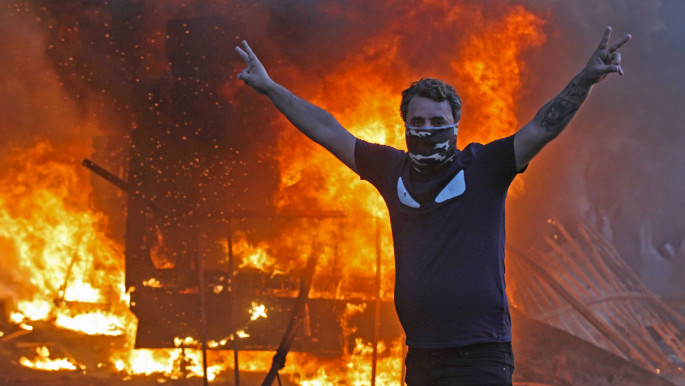Iraq protests escalate as six more demonstrators shot dead, hundreds injured
Six more protesters were shot dead in Iraq on Thursday, health officials said, with unrest spreading to the country's south.
The deaths in the southern city of Nasiriyah were the deadliest incident yet in three days of nationwide demonstrations.
Another 56 people were wounded in the protest, regional health chief Abdulhussein al-Jaberi said.
A total of 27 people, including two police officers, have been killed since demonstrations against unemployment and corruption erupted in Iraq on Tuesday.
In Baghdad, several thousand protesters faced off against security forces on Thursday, defying a curfew imposed since dawn to contain the mass demonstrations.
They arrived by truckfuls at the capital's oil and industry ministry to protest against corruption, unemployment and poor services.
The apparently leaderless movement has posed the biggest challenge yet to Prime Minister Adel Abdel Mahdi, who has been in power for less than a year.
With internet access virtually shut off, demonstrators on Thursday struggled to communicate with each other or post footage of the latest clashes.
Approximately 75 percent of Iraq is "offline" after major network operators "intentionally restricted" access, according to cybersecurity monitor NetBlocks.
 |
|
| Iraqi security forces fired live rounds on Thursday to break up protests for a third day in Baghdad. [Getty] |
The protests appear to be largely spontaneous and de-centralised, with virtually no party flags or slogans spotted.
Instead, they brandished Iraqi flags, posters demanding a "real country", and even pictures of an Iraqi general who was recently decommissioned after reported pressure by pro-Iran factions.
"We will sacrifice our souls and our blood for you, Iraq!" demonstrators chanted.
Read more: Death toll rises in Iraq as security forces open fire on protests despite curfew
The protests began on Tuesday in Baghdad but have since spread across the mainly Shia south, including the provinces of Dhi Qar, Missan, Najaf, Basra, Wasit and Babylon.
Several cities have imposed curfews, but protesters flooded the streets regardless.
'Over 1,000 injured'
The grievances echo those of mass demonstrations in Iraq's south a little over a year ago which were prompted by a severe water shortage that caused a widespread health crisis.
Since then, southern provinces have accused the central government of failing to address profound infrastructural gaps, chief among them youth unemployment.
Tensions have been exacerbated by the closure of government offices in Baghdad and calls by firebrand cleric Moqtada al-Sadr for "a general strike".
Sadr was behind the last round of major protests in Baghdad in 2016, when his supporters stormed the Green Zone - home to some ministries and embassies - but his involvement appears much more limited this time.
If his followers join the protests en masse, particularly as night falls, the rallies are expected to balloon even further.
The three days of demonstrations have left 27 people dead including one police officer, a toll confirmed by Iraq's Human Rights Commission.
More than 1,000 protesters and security personnel have been wounded.
More than half of those killed in the last three days have been in Nasiriyah, about 350 kilometres southeast of Baghdad.
The rallies appear to have split Iraqi officials.
President Barham Saleh insisted peaceful protest was a "constitutional right" and parliament demanded an investigation into the deaths.
But in an unpopular move, Abdel Mahdi blamed the violence on "aggressors who... deliberately created casualties".
Follow us on Twitter: @the_newarab





 Follow the Middle East's top stories in English at The New Arab on Google News
Follow the Middle East's top stories in English at The New Arab on Google News
![The UAE is widely suspected of arming the RSF militia [Getty]](/sites/default/files/styles/image_330x185/public/2024-11/GettyImages-472529908.jpg?h=69f2b9d0&itok=Yauw3YTG)
![Netanyahu furiously denounced the ICC [Getty]](/sites/default/files/styles/image_330x185/public/2024-11/GettyImages-2169352575.jpg?h=199d8c1f&itok=-vRiruf5)
![Both Hamas and the Palestinian Authority welcomed the ICC arrest warrants [Getty]](/sites/default/files/styles/image_330x185/public/2024-11/GettyImages-2178351173.jpg?h=199d8c1f&itok=TV858iVg)